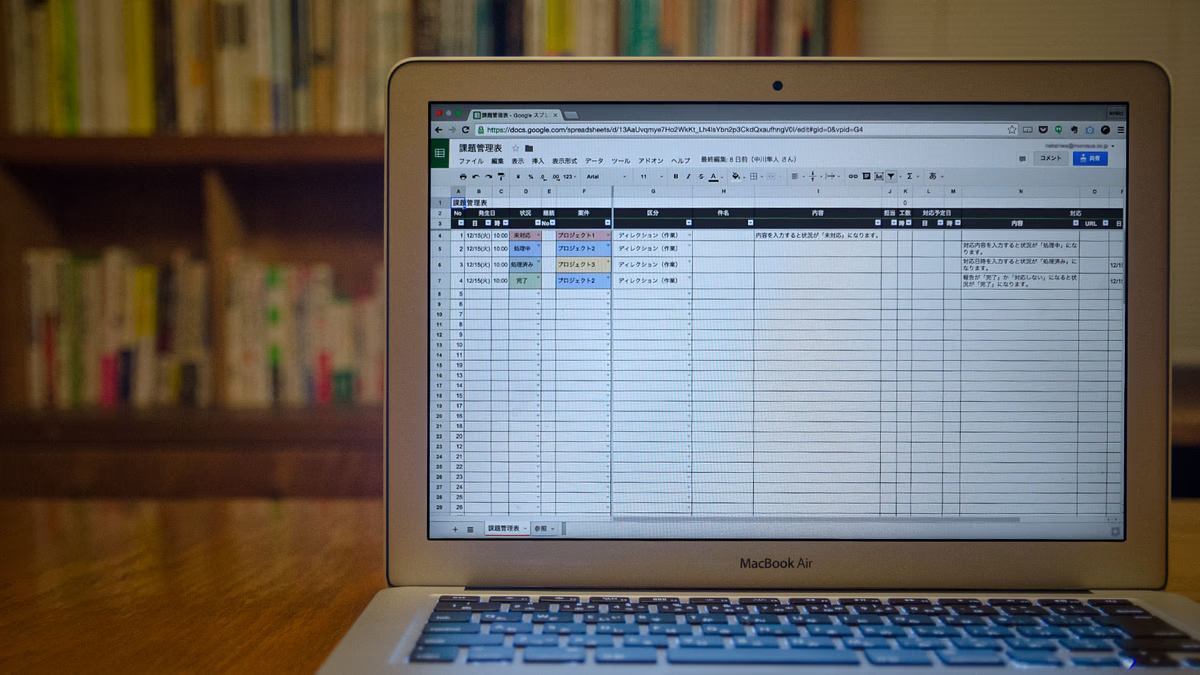This article will introduce you to some ways to stay up all night safely.
I do not recommend staying up all night.
Hello, this is Director Nakagawa.
This may come as a surprise, but have you ever thought that you might not be able to make it in time unless you stay up all night ?
Staying up all night. Anyone who hears it will frown. Such a word. A word that does not convey a good image for individuals, organizations, or society, a word that is like a symbol of the dark attribute in RPGs (role-playing games).
If you've ever stayed up all night, you know that it's best not to do it. No one will be happy if you do. There are also high risks involved.
However, there are of course times when you find yourself in a situation where you really have no choice but to do it.
I myself have stayed up all night before, but no matter how hard I tried, it didn't work out. To put it simply, the only times when staying up all night worked out well were when a precise plan was made that took the night into account and the work proceeded exactly as planned .
I know it sounds a bit self-proclaimed, but thanks to the years of guidance from Vice President Nagai, I am good at calculating man-hours. I would like to use that knowledge to explain in chronological order what risks there are in staying up all night, what you should consider, and how to proceed so that you can stay up all night as safely and securely as possible.
table of contents
- The risks of staying up all night and other options to consider the day before
- "All-nighter hours and determination" to consider on the day of the all-nighter
- "Break, motivation, and reporting" to think about while staying up all night
- After an all-nighter, I think about gratitude and how to work the next day
- Reflection after an all-nighter
1. Think about the risks of staying up all night and other options the day before
I'll just say it straight out: it's a bad idea to think about staying up all night on the night you actually plan to do something.
Because staying up all night is a very powerful double-edged sword and at the same time a last resort, once you use it there's no going back.
Members who stay up all night, including myself, are exhausted, and their concentration and judgment are impaired, which reduces productivity. In some cases, we may have to take the whole next day off.
Therefore, the first thing you should think about is not "Do I have to stay up all night?" but "How can I get work done without staying up all night?"
To catch up on delayed work, you need to adjust your schedule and resources. However, you can't make these adjustments on your own. You may need to consult with your boss, sales, or customers, so it will take some time to make the adjustments. If it gets to the evening of the day, you won't have that time, and you'll have no choice but to stay up all night.

It is also important to organize the current situation using a task management sheet .
First, try to find other ways to do it before you run out of options. But in the back of your mind, it's best to also think about what you'll do if you end up staying up all night.
On the other hand, if you really need to stay up all night, it might be a good idea to consider staying up the day before you actually need to, as this will increase the chances of you being able to get ahead of your schedule.
2. Thinking about "the number of hours and determination required to stay up all night" on the day of staying up all night

When staying up all night becomes unavoidable, I calculate the "man-hours" it will cost me and prepare myself for it.
First of all, just working all night will not result in the same amount of work as usual.
If the usual work hours are 1, the overnight hours are roughly 1.3 to 1.5 times that amount. If the conditions are bad due to fatigue or sleepiness, it will be more than double that amount. A task that can be completed in 1 hour will take 1.5 to 2 hours, and a 2-hour task will take 3 to 4 hours.
Next, if you can catch the last train by 11pm, you will need to allocate one hour between 11pm and the start of work the next morning for a break and another one to three hours for a nap (sleep).
Assuming that the start time is 10:00, if you take a 2-4 hour break or nap during the 11 hours from 11:00 to 3:00 (10:00), the actual available man-hours will be 7-9 hours per person. This is roughly an additional 1 business day (8 hours) of work.
However, what we must not forget here is the "all-night labor hours" that I mentioned at the beginning.
If you estimate what would normally take 8 hours, but work overnight = 1.3 to 2 times the usual amount of time, you get the following (rounded down).
- 8 hours ÷ 1.3 times = 6 hours/person *Productivity down 25%
- 8 hours ÷ 1.5 times = 5 hours/person *Productivity down 38%
- 8 hours ÷ 2.0 times = 4 hours/person *Productivity down 50%
In this way, if you take into account the number of overnight man-hours, you can see how poor productivity is compared to normal man-hours. With this many man-hours per person, it may be impossible to finish the work even if you stay up all night. However, panicking at this point will not help anything, so it is more likely to produce good results if you prepare for the worst-case scenario but try to work carefully and without rushing.
Once you calculate the man-hours, you can get an idea of the approximate progress of the work done overnight.
Taking these factors into consideration, I consult and negotiate with my superiors, sales staff, team members, and in some cases clients before working all night.
3. Thinking about "breaks, motivation, and reporting" while staying up all night
When you start working all night, the first thing you need to be careful of is drowsiness. Drowsiness not only reduces productivity, but also poses great dangers such as inducing work mistakes.
When I start to feel sleepy, I try not to force myself to work and instead take a 15-minute nap.
The important thing at this time is to "close your eyes and take a 15-minute rest even if you can't sleep." My grandmother once taught me that "Just because you can't sleep doesn't mean you should get up and do anything. Just lying down with your eyes closed makes a big difference."

You may be concerned about emails or other work around you, but it's important to take a proper 15-minute break by blocking them out with music, etc. If you still feel sleepy after a 15-minute nap, take another 15-minute nap.
The next thing to be careful of is motivation. Because they have to work through the night, it is very easy for members' motivation to drop.
Therefore, it is important to first clearly define the goal of working all night and have everyone share the same objective, such as "If we get this far, today will be done!"
Other ways to keep people motivated include playing music (that won't make you sleepy), keeping the atmosphere in the room from becoming too dark, and encouraging team members to keep things motivated, which will help keep productivity from dropping.
The last thing to be careful about is reporting, communicating, and consulting.
Reporting, communicating, and consulting is important on a regular basis, but when team members have to stay up all night, they're tired and may not be able to do things that they normally do without any worries.
If this happens, there is a risk of work duplication or degradation, so if you make an effort to report, communicate, and consult more frequently than usual when working all night, you can reduce minor work mistakes and operational errors.

To summarize the specific things you should be careful about when reporting, communicating, and consulting...
- Tell others what you're currently working on
- When a task is completed, let others know
- Tell others what you're going to do next
These are very important, and if you neglect them just because you are tired, mistakes can easily occur. In fact, there have been many times in the past where work was duplicated due to lack of communication as described above, resulting in wasted man-hours.
4. After an all-nighter, I think about "gratitude and how to work the next day"
After an all-nighter, when the work is finished, I always make sure to thank all the members.
Whatever the reason for staying up all night, if even one person had been absent, the results would not have been what they were the next morning. Staying up all night is tough, but in order to not just remember it as "tough," it's important to convey your gratitude to the members who worked hard with you.

After staying up all night, some people may catch the first train home or go straight to work the next day, but the day after staying up all night, your productivity drops surprisingly. This is only natural, as staying up all night means "moving the work for the next day forward to the night before." Therefore, in some cases, you may need to adjust your schedule for the next day in advance.
You might be thinking, "Well, then there's no point in staying up all night," but there's no point if any of the project members get sick, so I always try to prioritize my own and the members' health.
5. Reflection the day after staying up all night
Now that the all-nighter is over safely and the members are back to normal, the next thing to think about is "what can we do to prevent the same thing from happening again?"
If we don't think about what caused this all-nighter and how we can schedule operations to avoid another all-nighter the next time it happens, the same thing will happen again.
This is not something that only one person needs to think about, but needs to be thought about by all the members involved. As long as you think, "It was someone's fault that we had to stay up all night," staying up all night will likely happen again. Once an all-nighter occurs during a project, it is no one's fault, but everyone's. By thinking about "what you can do to avoid staying up all night" and sharing this with all the members, you can greatly reduce the risk of staying up all night.
It's better not to
What do you think?
When we think of staying up all night, we tend to imagine everyone working silently, but in reality there is a lot that needs to be done, making it an extremely high-risk, low-return method.
I guess it's best not to stay up all night. It's still a dark attribute .
However, if you find yourself unavoidably staying up all night, I hope that reading this article will help you avoid having to stay up all night next time.

